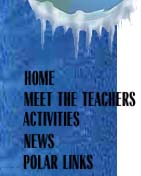 |
|
TEA Index Search
|
How to use this search page |
|
Looking for specific polar science content? Click the boxes below. The Search
field will locate material by and about specific teachers and researchers
involved in the TEA Program. Search using last names or keywords, if you do not know
the name of a teacher or researcher involved in TEA leave it blank. The
location button allows you to look for information related to just one or both
of the polar regions. Be sure to click the search button!
|
|
The results |
|
The search results provide information about science research documented on
this web site. Each result includes a summary of the field experience, the name
of the teacher and researcher on the team, links to specific suggested journal
entries and the teacherís page, the year the research was conducted, and a list
of content topics covered in the journal. Search results will be listed in
descending order starting with the most recent field year. Teachers who were in
the field in more recent years were able to better use technology to
communicate their experiences both in text and images. If your search does not
give you any results, try again using fewer selections.
|
|
Why this Search |
|
The TEA site contains a wealth of information about polar research. All
teachers who worked with research teams via the TEA Program were required to
keep a journal and communicate their experiences to students, teachers, and the
general public. The journals written by these teachers document not only the
experience of working on a research team in a polar environment, but also
convey the excitement of research. These first person accounts are an excellent
resource for bringing the excitement of science into the classroom. The search
function was developed to help teachers and students locate information that
would be most meaningful to their specific classroom experiences. All these
journals do an excellent job of conveying the national science standard of
human as a science endeavor, but they do so from a variety of science content
perspectives.
|
|
Credits |
|
This search function was developed by TEA teacher Amie Foster, Rob McDonald,
and Arlyn Bruccoli. Many TEA teachers contributed to its development, but it
would never have come to fruition were it not for the work of Ms. Foster and
the considerable technical expertise of Mr. McDonald.
|
|


